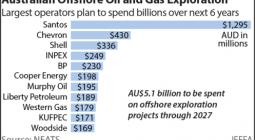Oil and gas firms planning ‘frightening’ fossil fuels growth, report finds

Analysis released at Cop27 climate summit shows plans would thwart chances of keeping global heating to 1.5C
Oil and gas companies are planning a “frightening” expansion that would result in 115bn tonnes of climate-heating CO2 being pumped out, equivalent to more than 24 years of US emissions, a new analysis has found.
Virtually all oil and gas companies are planning further exploitation of fossil fuels, the report found, pouring $160bn dollars into exploration since 2020. None of this investment is compatible with the International Energy Agency’s (IEA) route to reaching net zero emissions by 2050 and limiting the climate crisis, the report said.
It was released at the Cop27 climate summit in Egypt, where leaders have been warned that deep and rapid cuts to carbon emissions are needed to avoid climate catastrophe. But the analysis found that 655 of 685 (96%) of exploration and production companies have expansion plans, with their short-term expansion plans increasing by 20% since 2021.
The IEA said in 2021 that no new fossil fuel projects could go ahead from 2022 if the world is to tackle global heating and its worsening impacts on billions of people. The analysis, by German NGO Urgewald and 50 NGO partners, also found expansion plans for the export of liquefied gas around the world would more than double under current plans.
This would lead to emissions equivalent to the current annual emissions of the African continent.
Russia’s war in Ukraine and the continuing recovery from the Covid pandemic has sent energy prices soaring this year, prompting some countries and companies to increase their exploration. However, several major studies have shown that the vast majority of existing fossil fuel reserves must remain underground to avoid climate breakdown. Many observers argue that getting off fossil fuels, through cheap renewables and efficiency, is the fast and permanent solution to high energy prices.
Urgewald’s analysis is based on a company-level database that covers the companies accountable for 95% of global oil and gas production. The data allows assessment of whether a company’s activities are in line with the IEA’s net zero emissions scenario.
“The outcome of our calculations is truly frightening: oil and gas companies’ short-term expansion plans are not in line with the net zero emissions course put forward by the IEA,” says Fiona Hauke at Urgewald. “Keeping these oil and gas resources in the ground is the bare minimum of what is needed to keep 1.5C attainable.”
A series of UN reports in the run up to Cop27 laid bare how close the planet is to climate catastrophe, with “no credible pathway [of carbon cuts] to 1.5C in place”. The world’s scientists agree that emissions must fall by about 50% by 2030 to keep the internationally agreed 1.5C limit within reach.
A Guardian investigation published in May revealed that the world’s biggest fossil fuel firms are planning scores of “carbon bomb” oil and gas projects that would drive the climate past 1.5C. That was based in part on Urgewald’s data, which the group has now updated.
The climate plans published by many oil and gas companies were savaged by UN secretary-general António Guterres at Cop27 on Tuesday: “So-called ‘net zero pledges’ that exclude core products [coal, oil, gas] are poisoning our planet. Using bogus ‘net zero’ pledges to cover up massive fossil fuel expansion is reprehensible. This toxic cover-up could push our world over the climate cliff.”
The Urgewald analysis found companies with the biggest net zero-busting plans are Saudi Aramco, QatarEnergy and Abu Dhabi National Oil Company, followed by Exxon Mobil, TotalEnergies and Chevron. This calculation included any projects that had not moved into the development phase before the end of 2021, the end date for new projects set by the IEA.
“The oil and gas companies are betting against our collective future,” said Katrin Ganswindt, at Urgewald.
The surge in liquefied gas export plans is centred in North America, with 44% of global liquefaction plants under development located in the US and 11% in Canada . Most of this gas would be produced by fracking. QatarEnergy and Gazprom are also among the companies with the biggest liquefied gas plans.
“Liquefied gas is a false solution,” said Lucie Pinson, at the NGO Reclaim Finance. “The newly planned projects will come too late to solve Europe’s energy crisis. But they will lock us into a high-carbon.”
The Urgewald report said Egypt, host of Cop27, is the “perfect example of the complete disconnect between the action needed and the reality on the ground”. It said 55 companies are exploring for new oil and gas resources across Egypt.
The Urgewald database was designed to help investors, insurers and banks adopt impactful fossil fuel policies and nearly 200 financial institutions are now using it.
cover photo: Wells extract oil from the oilfields near the megacity of Tianjin, China. The report found new exploration would result in 115bn tonnes of climate-heating CO2 being pumped out. Photograph: Sean Gallagher/The Guardian








